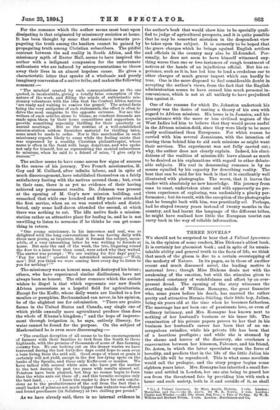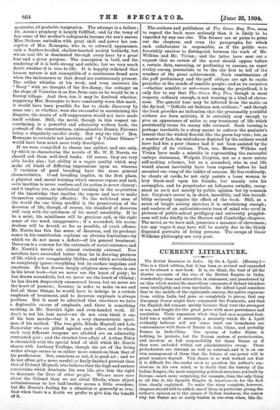THREE NOVELS.*
WE should not be surprised to hear that A Valiant ignorance is, in the opinion of some readers, Miss Dickens's ablest book. It is certainly her gloomiest book ; and in spite of its unmis- takable ability and general truth to the facts of life, we think that much of the gloom is due to a certain overstepping of the modesty of Nature. In its pages, as in those of another recent and much discussed novel, the leading motive is maternal love ; though Miss Dickens deals not with the awakening of the emotion, but with the stimulus given to unwonted constancy of watchfulness and effort by an ever- present dread. The opening of the story witnesses the startling suicide of William Romayne, the great financier who, some years before his death, has married the rather pretty and attractive Hermia Stirling, their little boy, Julian, being six years old at the time when he becomes fatherless. The marriage has not been one of passionate love, or even of ordinary intimacy, and Mrs. Romayne has known next to nothing of her husband's business or his inner life. The examination of his private papers proves to her that in his business her husband's career has been that of an un- scrupulous swindler, while his private life has been that of a heartless profligate ; and while she is stunned by the shame and horror of the discovery, she overhears a conversation between her kinsman, Falconer, and his friend, Dr. Aston, in which the latter speculates upon the force of heredity, and predicts that in the life of the little Julian his father's life will be reproduced. This is what some novelists would call the prologue, and the story proper begins some eighteen years later. Mrs. Romayne has inherited a small for- tune and settled in London, her one aim being to guard her son from the threatened fate by providing him with such a home and such society, both in it and outside of it, as shall • (1.) A Valiant Ignorance. By Mary Amtela Dickens. 3 vols. London: Macmillan and co.—(2.) St. Ann's. By W. E. Norris. 2 vols. London: Ohatto and Windus —O.) The Green Bay Tree a Tale of To-Day. By W. H. Wilkins and Herbert Vivian. 3 vols. London: Hutchinson and 00. neutralise all probable temptation. The attempt is a failure ; Dr. Aston's prophecy is largely fulfilled; and by the irony of fate some of the mother's safeguards become the son's snares. Miss Dickens embodies with great skill and power her con- ception of Mrs. Romayne, who is, to outward appearance, only a feather-headed, shallow-hearted society butterfly, but whose real life is dominated through every hour by a great fear and a great purpose. The conception is bold, and the rendering of it is both strong and subtle; but we very much doubt whether it is true to life. It is happily ordained that human nature is not susceptible of a continuous dread save when the incitements to that dread are continuously present. The collier whistles at his work, and even uncovers his " Davy " with no thought of the fire-damp; the cottager on the slope of Vesuvius is as free from care as he would be in a Surrey village. And then, too, it may be doubted whether, supposing Mrs. Romayne to have constantly worn this mask, it would have been possible for her to elude discovery by some one ; or whether, were she successful in maintaining the disguise, the strain of self-suppression would not have made itself evident. Still, the novel, though in this respect un- convincing, is a powerful and admirably written book, the portrait of the conscientious, unimaginative Dennis Falconer being a singularly careful study. But why the title P Mrs. Romayne is certainly not ignorant, and "A Valiant Silence" would have been much more truly descriptive.
If we were compelled to choose one epithet, and one only, by which to characterise the novels of Mr. W. E. Norris, we should call them well-bred books. Of course, they are very able books also ; but ability is a vague quality which may make all kinds of differing impressions upon us, whereas 11 varieties of good breeding have the same general characteristics. Good breeding implies, in the first place, a physical and moral training which ensures repose and tact, —its inaction is never restless and its action is never clumsy; and it implies, too, an intellectual training in the acquisition of the knowledge that enables the repose and tact to make themselves constantly effective. To the well-bred man of the world the one thing needful is the preservation of the decorum of life, though, of course, his standard of decorum will vary with the quickness of his moral sensibility. If he be a saint, hie saintliness will be gracious and, in the right sense of the word, unaggressive ; if a scoundrel, his scoun- drelism will be devoid, so far as possible, of overt offence. Mr. Norris has this fine sense of decorum, and its predomi- nance in his constitution explains an obvious limitation—by which we do not mean a defect—of his general treatment. Decorum is a concern for the externals of social existence, and Mr. Norris's novels are almost curiously external. Few novelists have succeeded better than he in drawing pictures of life which are recognisably lifelike, and which nevertheless so completely ignore everything but its surface impulses and emotions. He has drawn deeply religious men—there is one in his latest book—but we never see the heart of piety; he has drawn scoundrels, but we never see the heart of villainy; he has drawn desperately enamoured lovers, but we never see the heart of passion ; because, in order to make us see and feel all these things, he would have to indulge in a certain emphasis of treatment, and to decorum emphasis is always perilous. But it must be admitted that elsewhere we have a deplorable excess of emphasis, and there is something soothing in Mr. Norris's light and even-handed work. St. Ann's is not his best novel—we do not even think it one of his best novels—but it is a very characteristic speci- men of his method. The two girls, Rhoda Meynell and Lola Hamersley who are pitted against each other, and to whom such very different weapons are allotted are an admirably contrasted pair ; and the ricochet love affair of Arthur Foley is chronicled with the special kind of skill which Mr. Norris shares with Anthony Trollope, though the art of the living writer always seems to us rather more conscious than that of his predecessor. But, conscious or not, it is good art ; and we do not often get a more careful or finely finished portrait than that of Colonel Meynell, who believes that the high and serious convictions which dominate his own life, give him the right to dominate the lives of other people. We are more sure about the Colonel than we are about Rhoda, whose abject submissiveness to her half-brother seems a little overdone, but Mr. Norris's feeling for a situation is generally so true, that when there is a doubt we prefer to give him the benefit of it. The authors and publishers of The Green Bay Tree, seem to regard the book more seriously than it is likely to be regarded by any one else. The former are at pains to point out the chapters, and even the paragraphs, for which each collaborator is responsible, as if the public were feverishly anxious to distinguish between the work of Mr. Wilkins and Mr. Vivian ; and the latter have sent out a request that no review of the novel should appear before a certain date, assuming, or professing to assume, an eager rivalry among journalists to be the the first to tell of the wonders of the great achievement. Such combinations of the puff preliminary and the puff oblique are apt to excite prejudice in the minds of sensible people ; and as we ourselves —whether sensible or not—were among the prejudiced, it is only fair to say that The Green Bay Tree, though in most respects ordinary enough, is not wanting in a kind of clever- ness. The general tone may be inferred from the motto on the fly-leaf, " Difficile est Satiram non scribere ; " and though the book provides no indication that the presumably youthful authors are born satirists, it is certainly easy enough to give an appearance of satire to any treatment of life which persistently turns its seamy side outward. Such turning is perhaps inevitable in a story meant to enforce the psalmist's lament that the wicked flourish like the green bay-tree; but, as a matter of fact, the wickedness depicted by the authors would have had but a poor chance had it not been assisted by the stupidity of its victims. Then, too, Messrs. Wilkins and Vivian have made a mistake in representing the successful embryo statesman, Walpole Coryton, not as a mere astute self-seeking schemer, but as a scoundrel, who in real life would almost inevitably have been exposed before he had mounted one rung of the ladder of success. He lies recklessly, he cheats at cards, he not only assists a loose woman to levy black-mail upon his friends, but meanly robs his accomplice, and he perpetrates an infamous swindle, recog- nised as such not merely by public opinion but by common law. Coryton's career is, in short, incredible, and this incredi- bility seriously impairs the effect of the book. Still, as a series of bright society sketches it is entertaining enough; and readers of an anti-aristocratic turn of mind who revel in pictures of public-school profligacy and university priggish- ness will take kindly to the Harrow and Cambridge chapters. The novel, as we have said, possesses a measure of cleverness; but any vogue it may have will be mainly due to the thinly disguised portraits of living persons. The scraps of Oscar Wildeian philosophy are very poor.



































 Previous page
Previous page